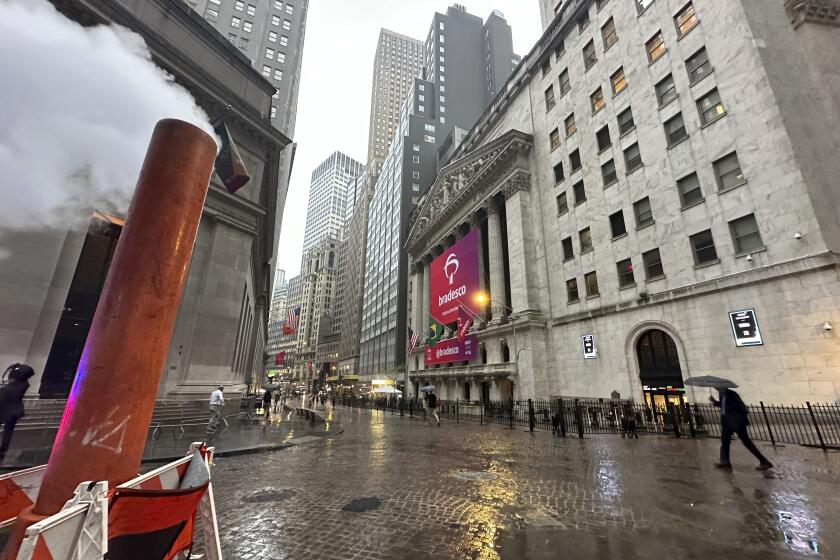Verdict Throws Fraud Probe a Curve : Commodities: The government must decide whether to indict 100 other traders and brokers. Whatever happens, reforms seem inevitable.
The failure of a jury on Monday to convict three currency traders from the Chicago Mercantile Exchange on either racketeering or fraud charges may force the government to reassess whether to seek additional indictments in its investigation of commodities traders who allegedly bilked customers and skimmed profits.
More than 100 brokers and traders at the Merc and the Chicago Board of Trade, who have not been charged by federal prosecutors, are under investigation, according to attorneys in the case. They may face indictments in the government’s extensive probe of corruption on the world’s largest commodities markets, the attorneys said.
Many of those under investigation work in trading pits where the government has not previously sought indictments, attorneys said.
Federal prosecutors could not be reached for comment Tuesday.
So far, 47 brokers and traders and one clerk have been indicted. Sixteen have admitted their guilt under plea-bargain agreements with the government.
The next trials stemming from the case, scheduled for September, involve brokers and traders from the Japanese yen pit at the Merc and the soybean pit at the Board of Trade.
“There are a lot of traders on the cusp of being indicted right now, and those people have received a tremendous shot in the arm” from the verdict, said an attorney representing several traders.
“The government may dismiss this verdict, but it still is going to have a big impact on how it proceeds in future cases,” the attorney added. “The government is not about to undertake weak prosecutions.”
In fact, the mixed verdicts in the first trial growing out of the FBI’s two-year undercover investigation is being widely viewed here as a major setback for the government. While two traders were found guilty of violating federal commodities laws, none of the three was convicted of the more serious charges of racketeering and fraud. The jury of nine women and three men failed to reach a verdict on many of the charges, so a partial mistrial was declared Monday by U.S. District Judge Ann C. Williams.
Although federal prosecutors vowed to seek a retrial, Merc officials maintained that the jury’s failure to find evidence of a widespread conspiracy vindicated the exchange’s longstanding assertion that trading abuses uncovered by the FBI represented isolated incidents. A Merc spokesman also noted that the convictions involved relatively small trades that cost customers only a few hundred dollars in lost profits. That raises questions, the spokesman said, about whether the multimillion-dollar investigation, involving four undercover FBI agents posing as traders, represented a wise investment of government resources.
“This verdict is a substantial rejection of the idea that there was widespread wrongdoing here at the exchange,” the spokesman said. “I think traders do feel vindicated. . . . They always felt this was blown out of proportion.”
Defense attorneys agreed that the most damaging blow to the government’s trial strategy came from the jury’s refusal to accept the government’s premise that illegal trades observed by an undercover FBI agent were part of a widespread racketeering conspiracy.
“I don’t know what the impact of this verdict will be on other cases, but it shows that juries are not going to be quick to accept racketeering as an appropriate tool (for the prosecution) in this context,” said Alan Blumenthal, who represented one of the three currency traders. “This jury basically repudiated the idea of a scheme or a conspiracy.”
But if the prosecutors have yet to land a big fish in court, the government’s dramatic use of an undercover sting operation has had a lasting impact on traders and the exchanges themselves. Since the investigation was revealed in January, 1989, traders have reportedly been far more cautious and circumspect, partly out of a fear that government agents or informants are still operating on the floors of the exchanges. In fact, traders are apparently so suspicious that some have been ostracized after being wrongly accused of being informants, lawyers say.
“Everybody thinks there are snitches down there,” one attorney said.
Meanwhile, a series of reform measures have either been proposed or put in place by the two exchanges and the Commodities Futures Trading Commission, the federal agency that oversees commodities trading. The changes should cut down on the ability of traders to cheat customers and skim trading profits.
Most of the reforms are aimed at tightening traders’ reporting requirements under the frenzied and antiquated “open outcry” system used in Chicago’s pits. A number of rules changes by the exchanges have already shortened the time between when a trade occurs and when it is officially recorded.
At the Merc, for instance, trading cards, which list each transaction, are picked up from traders every half hour. Previously, they were collected only twice a day. That should make it easier to spot traders’ attempts to rewrite orders and falsify prices in order to benefit themselves.
The biggest change could come from a proposal by both the Merc and the Board of Trade to develop hand-held electronic trading devices. The gadgets would automatically--and immediately--send each transaction to a central clearing center.
Dennis Klejna, director of enforcement for the CFTC, said Tuesday that he doesn’t believe that Monday’s verdict will have any effect on the ongoing efforts to reform trading practices in Chicago.
He added that, given the fact that the government may seek to retry the three currency traders, “the Merc’s sense of vindication (of its current system) may prove to be premature.”






